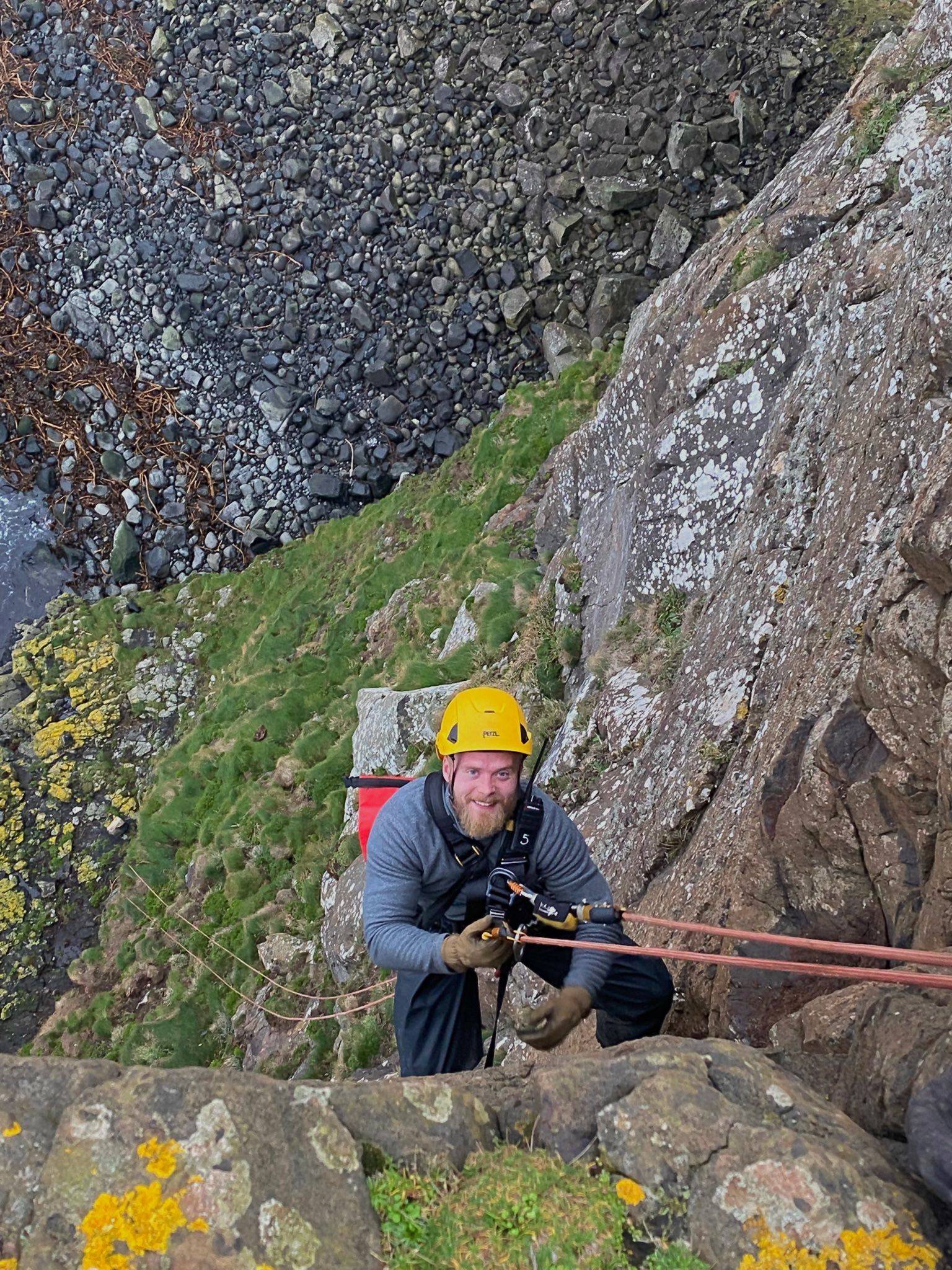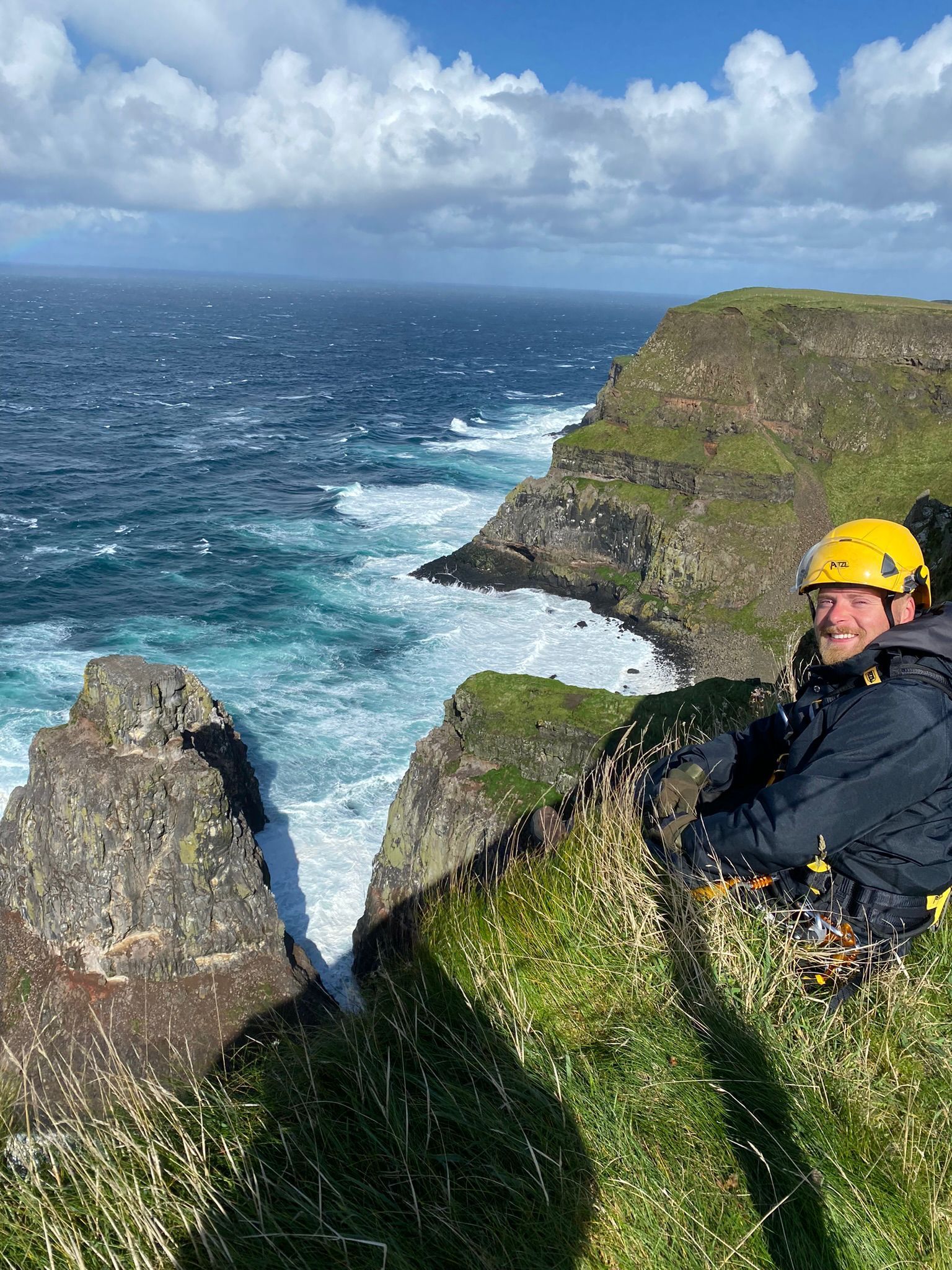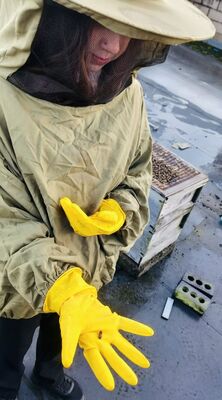AARON Kelly has reached new heights – literally.
Just over two years ago he picked up an Aisling Award for his work protecting the wildlife of Black Mountain, and here he is scaling cliff-faces on Rathlin Island as part of an amazing project to protect the island’s birdlife. And at 27, he’s only getting started.
Aaron has spent the winter on the island braving the elements – and the heights – to help achieve something extraordinary: rid the island of rats. “The birds on Rathlin have evolved to live with other birds, their only predators come from the sky in the form of birds of prey,” he told me. “When the rats got on to the island – brought accidentally by humans on boats – they began to eat their eggs, chicks and even the birds themselves.
“The seabirds have never adapted to have a defence against ground-attacking predators – they’re there for the taking.”
The birds have paid a terrible price. Numbers have plummeted in recent years as invasive predators have taken their toll, particularly during breeding season, but overfishing and climate change are also impacting.
Aaron is part of the LIFE Raft project, co-led by the Rathlin Development and Community Association and RSPBNI, which is truly awesome in its scale and ambition. To rid Rathlin of rats, 6,700 traps have been set out all across the island, each 50 metres apart.
“Not a single rat can be missed,” says Aaron. “This job is unreal. We have to access places and areas that you can’t walk down to put out traps for the rats.
“We’re working with the best climbers in the world, jumping down into remote areas, abseiling down cliffs up to 180 meters high.
“Before I started I was afraid of heights, I was shaking the first time I was at the top of a cliff. But I’m not any more and I love it now. I would climb every day of the week.
“The work I do now is like something I would have watched on a documentary when I was a kid. It’s really surreal, to be honest. It’s about as far away from the ’Murph as you can get!”
He points out that similar strategies to remove invasive species have produced positive results on other islands around the world. Beautiful puffins – puifíní in Irish – which nest in burrows around the cliff edges are easy prey for rats.
“Puffins have one chick a year, and on Rathlin in 2023 only one out of every three chicks survived. On islands where they have already done this eradication work you’re likely to see much closer to two out of three surviving,” says Aaron.
The LIFE Raft project on Rathlin is certainly working. Aaron hasn’t seen a rat since he started work there last June. But he knows they are there when he sees the rodenticide eaten.
“The stations have bait in them, it makes the rats feel sick so they go underground,” says Aaron. “Before the project started the rats were seen on trail cameras, but not since, but there have been fresh signs and we know that there are more out there. You can’t afford to miss one rat. We have to get them all.”
In Autumn 2023 LIFE Raft was focusing on the ferret population – another predatory species brought to the island and left behind by rabbit-hunters to wreak havoc on nesting birds.
Around 100 ferrets have been killed but the island can’t declare itself ferret-free until two years have passed, so it should be a great occasion when that happens later this year. In a couple of years, when Rathlin hopefully declares itself rat-free, Aaron can feel a special sense of pride that he bravely scaled those cliffs.
He says that birds can bounce back when rats are removed. “We’re hoping that by doing this we’ll get Manx shearwaters and storm petrels breeding in big numbers on Rathlin again. There are islands in Scotland that lost storm petrels because of rats but now they’ve returned.”
Aaron takes the quick way down the cliff
This spring could be the first time when the nesting seabirds on Rathlin get to breed in peace. “We’re hoping to see good results this year. It was very quiet over the winter but we’re starting to see the fulmars going back to the cliffs to claim their nest sites. It’s very exciting.”
Aaron adores his work, but he’s just as excited to return home to Black Mountain at weekends. “I miss it,” he admits. “Being on Rathlin makes me realise how much I love the mountain. People usually miss friends – I miss the mountain!
“It’s weird not being able to see badgers and foxes and pine martens. My dawn chorus is curlew and oystercatchers and redshank, but in truth I’d rather have blackbirds and blackcaps.
“The mountain is my first love and I want to do all I can to ensure it is protected forever, not for us but for the wildlife. If the mountain is sorted, then I’d like to work on projects in other countries.”
This is a young man who’s literally scaling new heights.
• Aaron is leading a Dusk Walk on Rathlin on Saturday February 22 from 4pm. Book a place on rathlin360.com
• If you’ve seen or photographed anything interesting, or have any nature questions, you can text Dúlra on 07801 418404.







